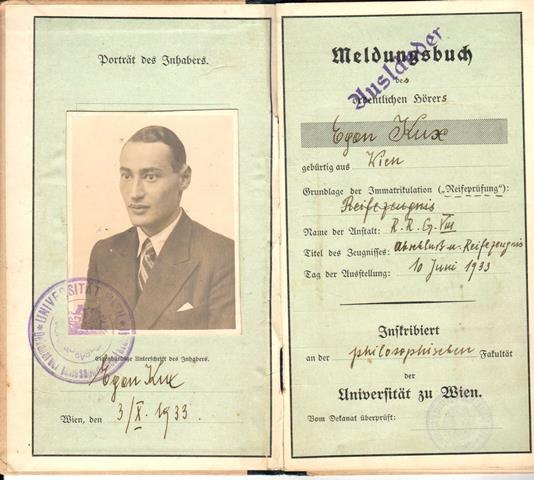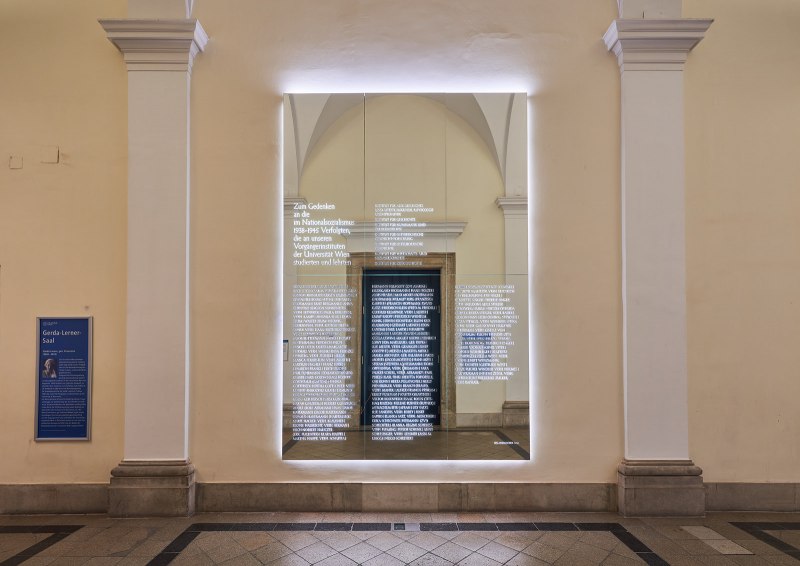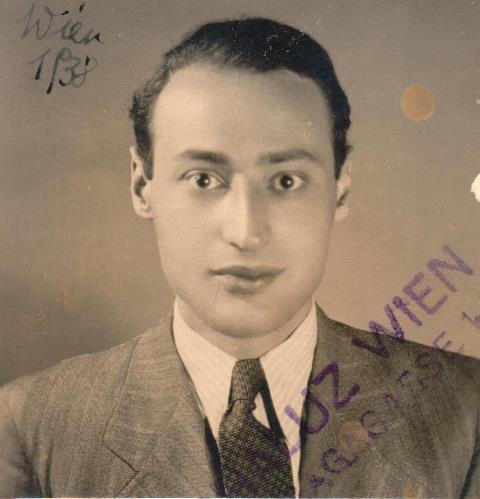Egon Kux (Kadmon)
Ehrungen
| Ehrung | Titel | Datierung | Fakultät | |
|---|---|---|---|---|
| Denkmal „Vertriebene Historiker*innen“ | 2022 | Historisch-Kulturwissenschaftliche Fakultät |
|
- Geschichte
- Philosophische Fakultät
Egon KUX, geb. am 17. Juni 1913 in Wien (heimatberechtigt in Zilina/Österreich-Ungarn [Slowakei], Staatsbürgerschaft 1938: Tschechoslowakei), Sohn von Emil Kux (Schuhfabrikant und Bankier, gest. 1944 Bratislava) und Ernestine Kux, geb. Bernstein (gest. 1962 Bratislava), wohnte in Wien 8, Albertgasse 3/5. Nach der Reifeprüfung am 12. Juni 1933 am Bundesrealgymnasium in Wien 8 war er von Win-tersemester 1933/34 bis Sommersemester 1937 an der Philosophischen Fakultät der Universität Wien inskribiert, studierte Geschichte und befand sich 1938 im Stadium der Abschlussprüfungen.
Er hatte bereits am 15. Dezember 1937 seine Dissertation mit dem Titel "Die innere Politik der Regierung Erzherzog Rainer–Schmerling und ihre deutsche Außenpolitik im Spiegel von 'Ost und West'" eingereicht, die von den beiden Betreuern (Heinrich Srbik und Hans Hirsch) auch bereits am 30. Dezember 1937 approbiert worden war
Die Prüfer für die beiden abschließenden Rigorosen wurden noch festgelegt: für das 1. Rigorosum (eine zweistündige Prüfung über alle Bereiche der Geschichte) die Historiker Prof. Heinrich von Srbik und Prof. Hans Hirsch sowie der Geograf Prof.Hugo Hassinger – alle drei überzeugte Antisemiten und Nationalsozialisten –, für das 2. Rigorosum ("Philosophicum", eine einstündige Prüfung über philosophische Fragen der Wissenschaften) der Philosoph Prof. Robert Reininger und der Pädagoge Prof. Richard Meister. Ein Prüfungsdatum wurde aber gar nicht mehr festgelegt, das Promotionsverfahren brach an dieser Stelle ab. Der "Anschluss" verhinderte den Abschluss des Studiums und Egon Kux musste die Universität mit einer approbierten Dissertation, aber ohne akademischen Abschluss oder Doktorgrad verlassen.
Mehr über die Biographie von Egon Kux von seinem Enkel Itai Hermelin in 2014:
"Egon Kux was born in Vienna on June 17, 1913. His father Emil Kux was born in Zilina (modern days in north west Slovakia) and his mother Ernestine (Erna) nee Bernstein was born in Braila, Romania. Egon had an older sister named Anny. The Kux family was a wealthy bourgeois family. The father, Emil Kux, and his brothers owned a shoe factory and later owned a bank called “Brüder Kux” located in the noble Ringstrasse (Schottenring 14). The family lived in Albertgasse 3 in the 8th district of Vienna. Egon’s older sister, Anny, was a talented violinist.
In an untypical manner for someone from his socio-economical background Egon joined a Zionist-socialist youth movement called “Brith Bilu” that later merged into a similar youth movement called “Blau-Weiss”. In the youth movement Egon met his future wife Deli (Adele) Sternberg (born in Vienna on Sep. 18, 1917, died in Ein Gev, Israel. April 20, 2014). The main goal of the youth movement was to establish a just society in Palestine. Egon did not join his friends from the youth movement who emigrated to Palestine in 1935 and founded Kibbutz Ein Gev near the Sea of Galilee in 1937. The reason for staying behind was Egon’s desire to complete his Ph.D. studies in history in the University of Vienna.
Unfortunately, even though he completed his dissertation and submitted it, Egon was unable to get his degree after the Anschluss because he was a Jew.
In July 1938 Egon and Deli got married in the Seitenstettengasse synagogue.
At that time they could not get a certificate to Palestine so they decided to go to Denmark for agricultural training before going to Palestine. On the morning of Nov 9, 1938 (without any knowledge of what is going to happen later that day…) Egon took advantage of his Czechoslovak citizenship to leave Vienna with his wife for Prague. A month later, in December 1938, they got the certificate to go to Denmark and went there by a train through Berlin.
In Denmark Egon and Deli worked in a farm and Egon was also active in the Zionist movement. During the stay in Denmark Deli had an accident that left her crippled for life.
In October 1943 (after a leak from the German establishment about the coming deportation of the Jews from Denmark) Egon and Deli were taken by the Danes in a fisherman boat to the safety of neutral Sweden (together with the other Jews of Denmark).
In Sweden they worked in a farm near Norrköping and in March 1945 (7 years after their marriage and 9 months after D-Day) Deli gave birth to their only daughter Naomi. In 1946 Egon became a headmaster of a school for Jewish children who survived the Holocaust and were brought from Bergen Belsen concentration camp to Sweden after the war. Egon taught the children about the geography of Palestine.
In July 1947 Egon, Deli and Naomi left Sweden and went with a ship from Marseille, France to Palestine. In Palestine they joined their friends in Kibbutz Ein Gev near the Sea of Galilee.
Egon, the history student from the wealthy family, fulfilled his dream to become a farmer, and worked for many years with the Kibbutz cows. Later he started working for the Kibbutz sailing company. Working as a tour guide in German, French and the Scandinavian languages, Egon told stories about the miracles performed by Jesus near the Sea of Galilee, the history of Kibbutz Ein Gev and its fulfillment of the socialist ideals.
When he decided to change his surname to a Hebrew name, Egon selected the name “Kadmon” meaning “ancient” in Hebrew, because of his affection to history.
Egon lived the rest of his life in Kibbutz Ein Gev until his death on July 11, 1993.
Egon never got to see his parents after he left Austria in 1938 when he was 25. His parents fled with his sister from Vienna to Bratislava (Anny married a non-Jewish German-Slovak Cellist and they used their ties in the music world). Egon’s father Emil Kux died in Bratislava in 1944 of natural causes. Egon’s mother Ernestine (Erna) died in Bratislava behind the iron curtain in 1962. Many of Egon’s very much assimilated uncles, aunts and cousins were murdered by the Nazis."
Ehrung
Seit 2009 wird an ihn im "Gedenkbuch für die Opfer des Nationalsozialismus an der Universität Wien 1938" erinnert (online).
Seit 2022 findet sich sein Name auch auf dem "Wenn Namen leuchten | Denkmal für die im Nationalsozialismus vertriebenen Geschichte-Studierenden und -Lehrenden der Universität Wien", im ersten Stock des Hauptgebäudes der Universität.
Archiv der Universität Wien, Nationale PHIL 1933-1938, Rigorosenprotokoll und Rigorosenakt PHIL 14059; PHIL GZ 8 ex 1937/38 ONr. 28; freundlicher Hinweis seines Enkels Itai Hermelin, Tel Aviv/Israel 2014.
Zuletzt aktualisiert am 26.06.2024 - 11:48
-

Meldungsbuch Egon Kux 1933–1937
-

Denkmal für die im Nationalsozialismus vertriebenen Geschichte-Studierenden und -Lehrenden („Wenn Namen leuchten“, Iris Andraschek, 2022)
Denkmal für die im Nationalsozialismus vertriebenen Geschichte-Studierenden und -Lehrenden ("Wenn Namen leuchten", Iris Andraschek, 2022)

